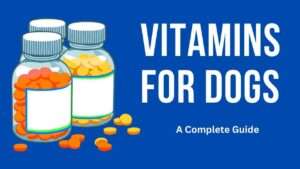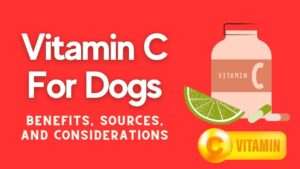In the pursuit of providing the best care for our beloved pets, the role of antioxidants has garnered significant attention. These potent compounds play a pivotal role in combating the harmful effects of oxidative stress, which can lead to various health issues in dogs. But what exactly are antioxidants, and how can they benefit our furry friends? Join us on a journey through the world of antioxidants for dogs, exploring their importance, sources, and practical tips for integrating them into your pet’s diet for optimal health and longevity.
Contents Overview
Understanding Antioxidants
Oxidative stress is a biochemical imbalance that occurs when there’s an excess of harmful molecules called free radicals in the body. Free radicals are highly reactive molecules with unpaired electrons, which makes them unstable and prone to causing damage to cells, proteins, and DNA. This damage, known as oxidative damage, can lead to various health issues and accelerate the aging process in both humans and dogs.
The Role of Antioxidants
Antioxidants are molecules that counteract oxidative stress by neutralizing free radicals. They work by donating electrons to stabilize free radicals, thus preventing them from causing further damage to cells and tissues. In essence, antioxidants act as guardians, protecting the body from the harmful effects of oxidative stress.
Types of Antioxidants
There are several types of antioxidants, each with unique mechanisms of action and sources:
- Enzymatic Antioxidants: These are naturally occurring enzymes in the body that help neutralize free radicals. Examples include superoxide dismutase (SOD), catalase, and glutathione peroxidase.
- Nutrient Antioxidants: These are antioxidants that are obtained from the diet. They include vitamins such as vitamin C, vitamin E, and beta-carotene (a precursor to vitamin A), as well as minerals like selenium and zinc.
- Phytochemical Antioxidants: Found in plant-based foods, phytochemical antioxidants include flavonoids, polyphenols, and carotenoids. These compounds give fruits, vegetables, and herbs their vibrant colors and offer numerous health benefits.
Benefits of Antioxidants for Dogs
Antioxidants play a crucial role in promoting the health and longevity of dogs by combating oxidative stress, supporting various bodily functions, and mitigating the effects of aging and disease. Let’s delve deeper into the specific benefits that antioxidants offer to our canine companions:
- Enhanced Immune Function:
- Antioxidants bolster the immune system by neutralizing free radicals and reducing oxidative damage to immune cells.
- A robust immune system helps dogs fend off infections, viruses, and other pathogens more effectively, leading to fewer illnesses and a higher quality of life.
- Joint Health and Mobility Support:
- Certain antioxidants, such as omega-3 fatty acids found in fish oil, possess anti-inflammatory properties that can alleviate joint inflammation and pain.
- By reducing inflammation and promoting joint lubrication, antioxidants help improve mobility, especially in senior dogs or those with arthritis or joint conditions.
- Healthy Skin and Coat:
- Antioxidants like vitamins A, C, and E, along with omega-3 fatty acids, contribute to healthy skin and a shiny coat.
- These nutrients support skin cell regeneration, maintain moisture balance, and protect against oxidative damage caused by environmental factors like UV radiation and pollution.
- Cardiovascular Support:
- Antioxidants help maintain heart health by reducing oxidative stress on blood vessels and preventing the oxidation of LDL cholesterol.
- By supporting proper circulation and vascular function, antioxidants can lower the risk of cardiovascular diseases such as heart attacks and strokes in dogs.
- Cognitive Function:
- Certain antioxidants, such as flavonoids and polyphenols found in fruits and vegetables, have neuroprotective effects and may help preserve cognitive function in aging dogs.
- By reducing oxidative damage to brain cells and promoting neuroplasticity, antioxidants can support memory, learning, and overall cognitive health.
- Anti-Cancer Properties:
- Some antioxidants have been shown to possess anti-cancer properties by inhibiting the growth and proliferation of cancer cells and enhancing the body’s natural defense mechanisms against tumors.
- While antioxidants alone may not prevent cancer, they can play a supportive role in cancer prevention and treatment when combined with other interventions and a balanced diet.
- Overall Health and Longevity:
- By neutralizing free radicals and reducing oxidative stress throughout the body, antioxidants help maintain cellular integrity and function, which is essential for overall health and longevity.
- Dogs supplemented with antioxidants may experience improved energy levels, vitality, and resistance to age-related decline, allowing them to enjoy a higher quality of life well into their senior years.
In summary, antioxidants offer a multitude of benefits for dogs, ranging from immune support and joint health to skin and coat wellness, cardiovascular protection, cognitive function, and potentially even cancer prevention. By incorporating antioxidant-rich foods and supplements into their diet, dog owners can help their furry friends thrive and live longer, healthier lives.
Sources of Antioxidants for Dogs
Nature provides a rich array of antioxidant-rich foods that are not only delicious but also beneficial for dogs’ health and well-being. By incorporating these natural sources of antioxidants into their diet, dog owners can ensure their furry companions receive a diverse range of nutrients to support optimal health. Let’s explore some of the top sources of antioxidants for dogs:
- Berries:
- Berries such as blueberries, strawberries, raspberries, and blackberries are packed with antioxidants, including vitamin C, flavonoids, and anthocyanins.
- These antioxidants help neutralize free radicals, reduce inflammation, and support immune function in dogs.
- Berries can be offered fresh as treats or added to meals in moderation to provide a tasty and nutritious boost to your dog’s diet.
- Leafy Greens:
- Leafy green vegetables like spinach, kale, and broccoli are excellent sources of antioxidants, vitamins, and minerals.
- These vegetables contain antioxidants such as vitamin E, beta-carotene, and lutein, which promote cellular health and protect against oxidative damage.
- Leafy greens can be steamed or lightly cooked and mixed into your dog’s food to provide added nutrition and flavor.
- Omega-3 Fatty Acids:
- Fatty fish such as salmon, mackerel, and sardines are rich in omega-3 fatty acids, including EPA (eicosapentaenoic acid) and DHA (docosahexaenoic acid).
- Omega-3 fatty acids have potent anti-inflammatory and antioxidant properties, which can benefit dogs with skin allergies, joint issues, and heart disease.
- Fish oil supplements derived from these fatty fish can be added to your dog’s diet to provide a concentrated source of omega-3 fatty acids and antioxidants.
- Vitamin-Rich Foods:
- Foods rich in vitamins A, C, and E are valuable sources of antioxidants for dogs.
- Carrots, sweet potatoes, pumpkin, and bell peppers are examples of vitamin-rich foods that provide antioxidants to support immune function, skin health, and vision.
- Nuts such as almonds and hazelnuts are also rich in vitamin E, which acts as a powerful antioxidant and promotes skin and coat health in dogs.
- Herbs and Spices:
- Certain herbs and spices contain potent antioxidants and can be added to your dog’s meals for flavor and health benefits.
- Turmeric, ginger, parsley, and cinnamon are examples of herbs and spices with antioxidant properties that can support digestion, reduce inflammation, and boost immune function in dogs.
- When incorporating herbs and spices into your dog’s diet, it’s essential to use them in moderation and ensure they are safe for canine consumption.
By incorporating these antioxidant-rich foods into your dog’s diet, you can provide them with a wide range of nutrients to support their overall health and well-being. Remember to offer a balanced diet that includes a variety of antioxidant sources to ensure your dog receives all the essential nutrients they need to thrive.
Integrating Antioxidants into Your Dog's Diet: Tips and Considerations
Incorporating antioxidants into your dog’s diet is a proactive approach to promoting their health and well-being. However, it’s essential to do so in a safe and balanced manner to ensure optimal results. Here are some tips and considerations for integrating antioxidants into your dog’s diet effectively:
- Consult Your Veterinarian:
- Before making any significant dietary changes or introducing new supplements, consult your veterinarian.
- Your veterinarian can provide personalized recommendations based on your dog’s age, breed, health status, and specific nutritional needs.
- Gradual Introduction:
- Introduce new antioxidant-rich foods or supplements gradually to your dog’s diet.
- Sudden dietary changes can upset your dog’s stomach and lead to digestive issues. Slowly transition by mixing small amounts of new foods with their current diet over several days.
- Variety is Key:
- Offer a diverse range of antioxidant-rich foods to ensure your dog receives a broad spectrum of nutrients.
- Rotate between different fruits, vegetables, proteins, and supplements to provide variety and prevent nutritional deficiencies.
- Consider Your Dog’s Preferences:
- Pay attention to your dog’s preferences and dietary sensitivities when selecting antioxidant sources.
- Some dogs may prefer certain fruits or vegetables over others, while others may have allergies or intolerances to specific ingredients.
- Avoid Overfeeding:
- While antioxidants are beneficial, moderation is key.
- Avoid overfeeding high-calorie antioxidant-rich foods or supplements, as excessive intake can lead to weight gain and other health issues.
- Follow feeding guidelines provided by your veterinarian or the product manufacturer to ensure appropriate portions.
- Quality Matters:
- Choose high-quality, natural sources of antioxidants for your dog’s diet.
- Opt for fresh, whole foods whenever possible and avoid processed or artificially flavored products.
- Look for supplements that are specifically formulated for dogs and free from additives, fillers, and artificial preservatives.
- Monitor Your Dog’s Response:
- Keep an eye on your dog’s overall health and well-being after introducing antioxidants into their diet.
- Monitor for any signs of allergic reactions, digestive upset, or changes in behavior or stool quality.
- If you notice any adverse reactions, discontinue the new food or supplement and consult your veterinarian.
- Regular Veterinary Check-ups:
- Schedule regular check-ups with your veterinarian to monitor your dog’s health and nutritional status.
- Your veterinarian can assess your dog’s dietary needs, adjust their diet as necessary, and provide guidance on maintaining optimal health through proper nutrition.
By following these tips and considerations, you can effectively integrate antioxidants into your dog’s diet and support their overall health and well-being. Remember to prioritize safety, variety, and moderation to ensure your furry friend receives the essential nutrients they need to thrive.
Bottom Line
Incorporating antioxidants into your dog’s diet is a proactive approach to promoting their health and longevity naturally. By understanding the role of antioxidants, sourcing them from nutrient-rich foods, and integrating them into your pet’s diet mindfully, you can empower your furry friend to thrive from the inside out. Remember, a well-balanced diet, regular exercise, and preventive veterinary care are key pillars of canine wellness. Embrace the power of antioxidants as part of your holistic approach to caring for your canine companion, ensuring they enjoy a vibrant and fulfilling life by your side.



































+ There are no comments
Add yours